Jeremy McGrath @ Anaheim Supercross
By
The King of Supercross relives and retells memories of the place that gave him many crowning achievements.
It’s metaphorically fitting that Jeremy McGrath excelled in a venue surrounded by strong symbolism. The letter ‘A’, evokes thoughts of power and prominence and one of the biggest in the world towers over a California parking lot.
Pointing to the heavens, the haloed 230-ft. tall, 210 ton, ‘A’ outside Angel Stadium of Anaheim is, literally, why the place has been called “The Big A” since 1966.
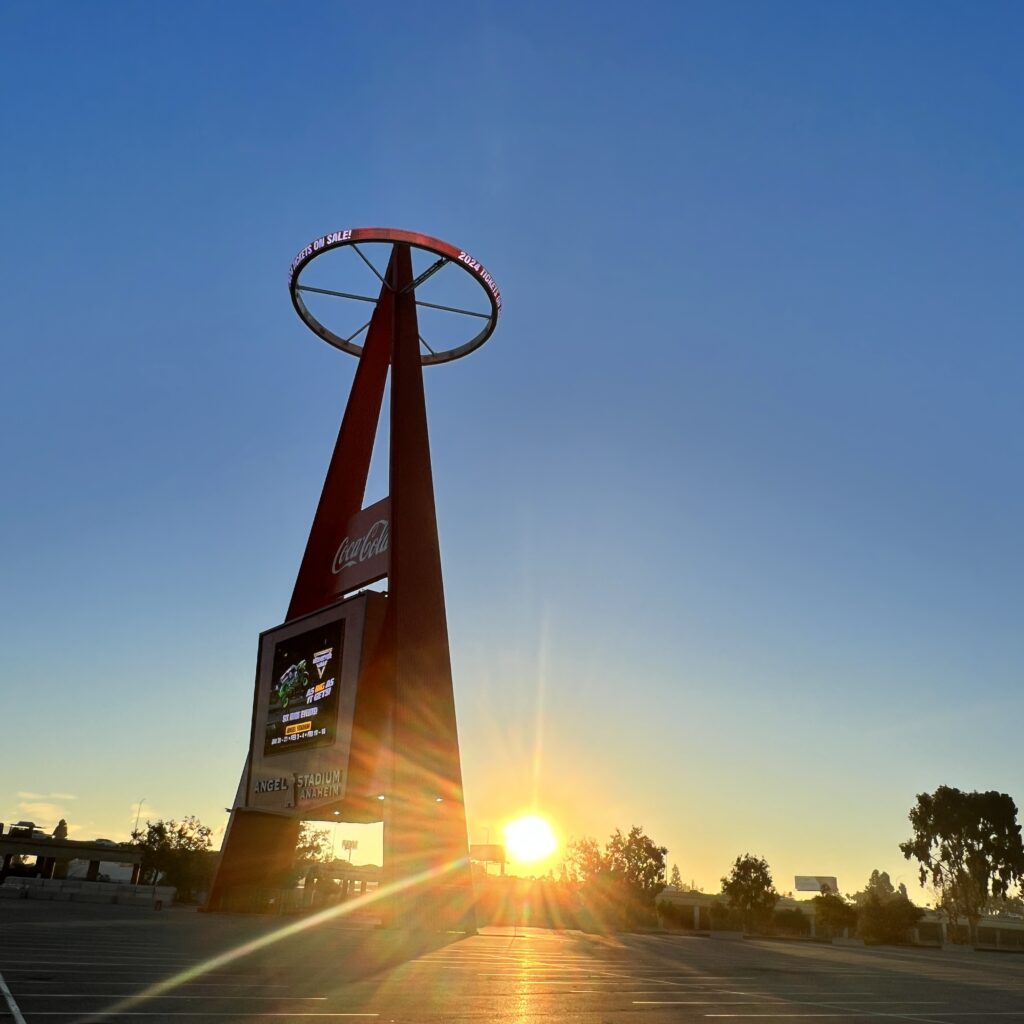
For baseball fans, this is where their beloved Angels play 81 games a year. For Supercross fans, it’s the house that Jeremy built, where he bookended his historic career, from his first win to this last.
Jeremy McGrath @ Anaheim Art

Jeremy McGrath’s Pro Debut
McGrath doesn’t remember going to the original Anaheim Stadium in January 1989 to race the opening round of the 125SX West series, doesn’t remember competing in his first ever Supercross, and can’t recall what place he got that night in front of 68,742 spectators (11th).
Those details were washed away long ago, likely replaced by the many returns trips where stronger memories–supported by the pop of flashbulbs and the roving eyes of ESPN’s camera lenses–were cemented in the minds of the masses who came there specifically to watch him.
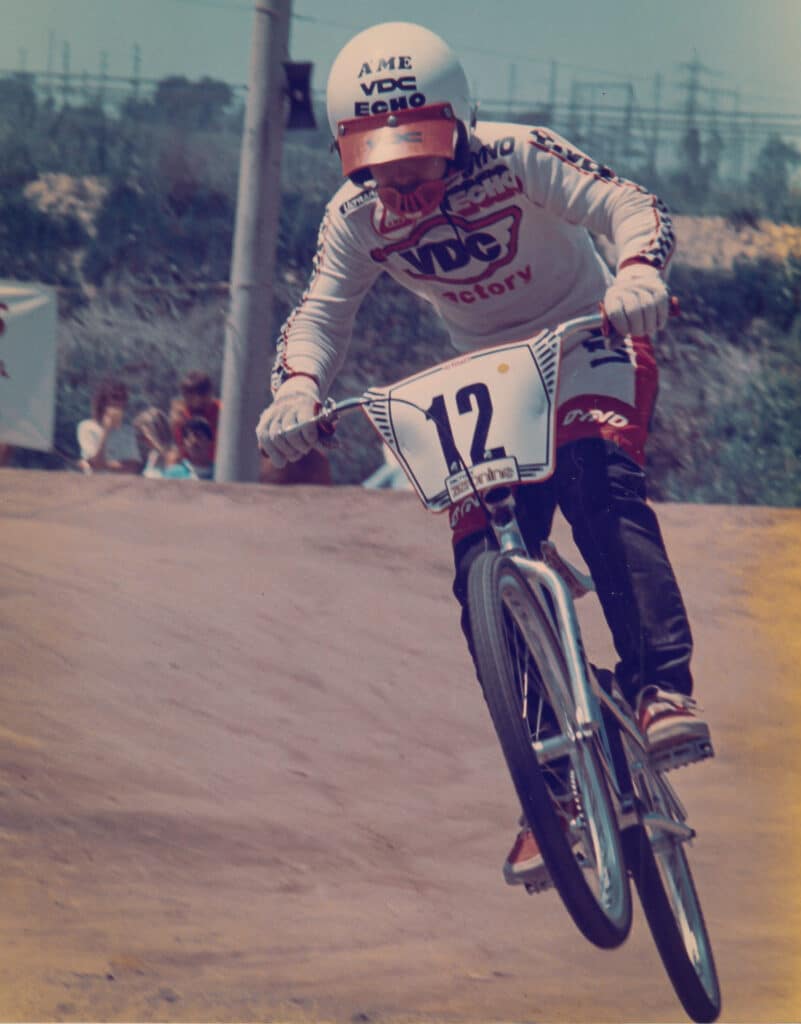
But he does remember the feeling he had when he inconspicuously arrived in a white Toyota xTra cab, long box, with a Bad Boy Club sticker on the tailgate (”I wanted to BE Ricky Johnson!”). In the truck bed was a Honda CR125, gear bag, tools and bike stand. Before he even rolled out onto the haybale-and streamer-banner-lined track, he felt a sense of accomplishment. He wasn’t at all nervous.
“I was beyond excited because that was the dream coming true,” he says today, while sitting in the guest house of an estate built from winning. A lot. When told that he finished outside the top 10, he said he was likely upset that he didn’t do better. “It was my time to shine and I didn’t. 11th is not shining!”
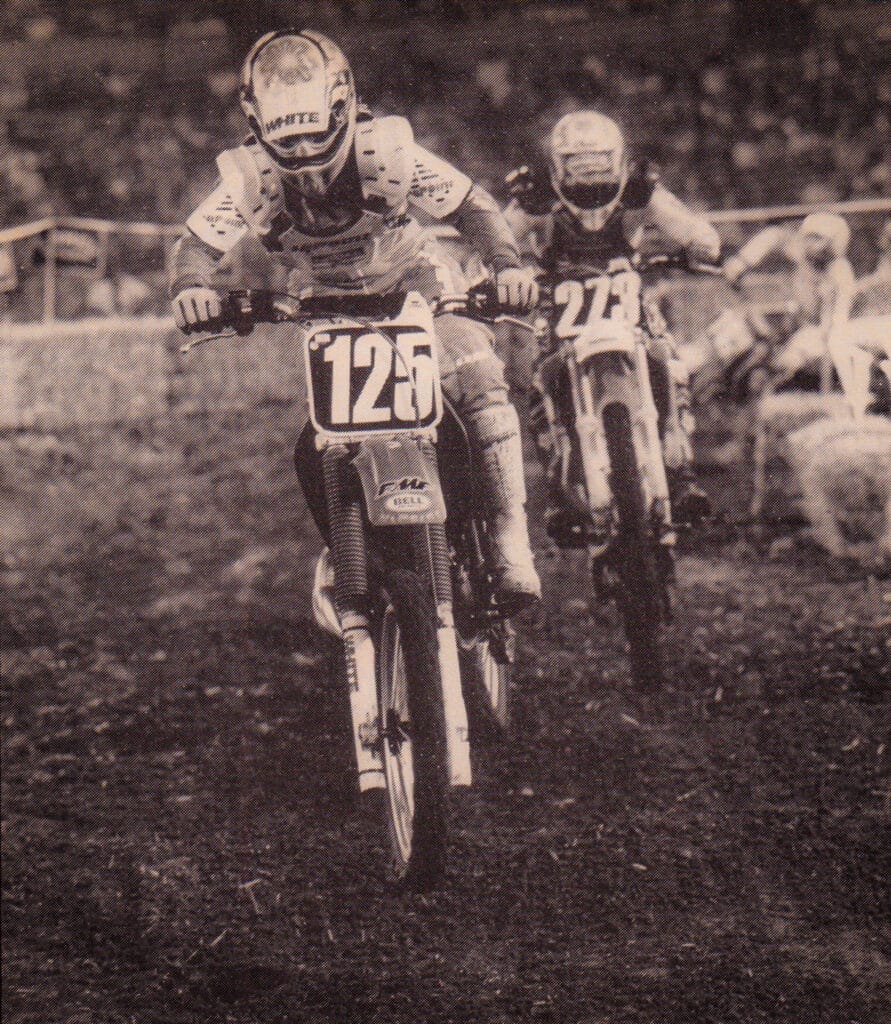
What follows is a series of anecdotes about the nights he did shine, told by The King of Supercross, while he autographed a stack of 72 prints designed in honor of his wins at Anaheim and his accomplishments in this sport, 72 wins and seven championships, which put him at the top of the pyramid, the top of the A.
1993: Win #1
In late January 1993, McGrath was back at Anaheim, still riding a red bike (nuclear red, technically) and still arriving in a red truck (a Skip Norfolk-driven box truck, technically). It was the third round of the 1993 AMA Camel Supercross series, the third race in his rookie season in the premier class and he sat 6th in points.
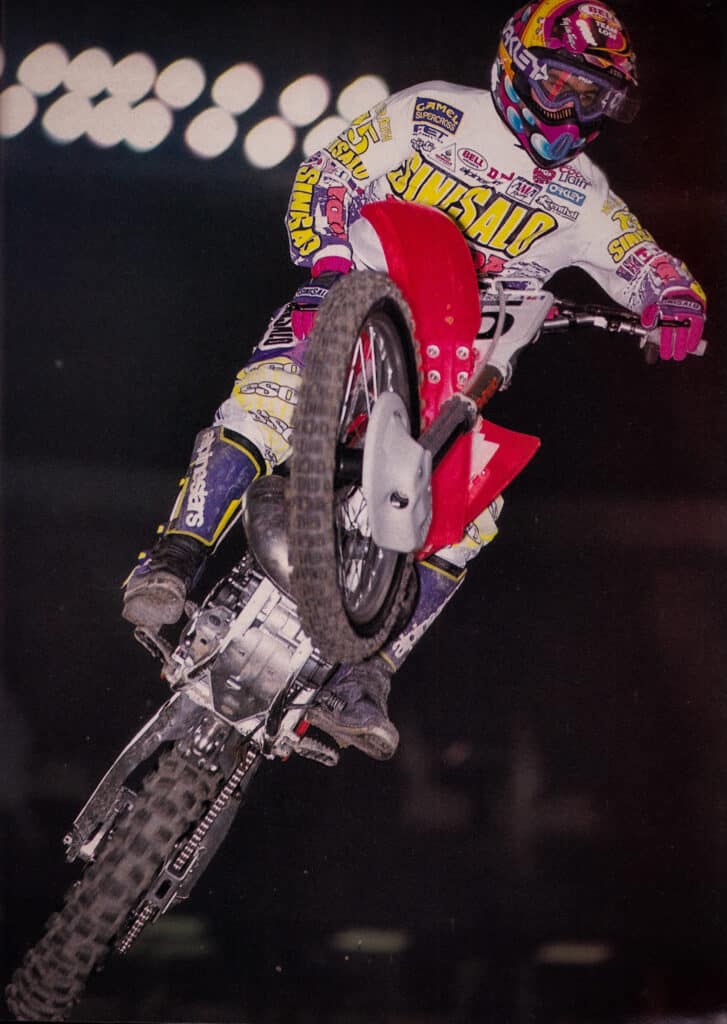
But before he gets too deep into what and how he felt that night, just four years beyond his humble beginnings, McGrath wants to talk first about money. Not how much he made, (judging from the zip code and the view of the Pacific Ocean in the distance, he did ok) rather, what he didn’t make. At the beginning, at least.
He now laughs at himself for the rare moment in his racing career where he didn’t quite believe in himself enough to gamble on his own skills.
After winning two 125SX West championships and 13 races (two of them in Anaheim), McGrath moved to the next challenge and American Honda offered him $100,000 per year for two years. In the contract’s original draft, the performance bonuses paid for top three finishes in main events: $10,000, $5,000, $3,000 for 1st, 2nd, 3rd. At some point during negotiations, however, McGrath had a feeling of doubt.
FAST TRIVIA
Jeremy McGrath won 72 main events in the premier class. How many did he race (including his post-retirement return)
“I’m going into the ‘93 season basically racing against my heroes,” McGrath says while gracefully running a silver paint marker through the motions of his five syllable name. “I’m like, ‘These guys are gods. They’re unbeatable’. We’re in this [contract] signing and I’m like, ‘There’s no way I can get top three. This can be so hard’.”
McGrath asked for an amendment to the performance payout clause. He didn’t see where he fit into the results column of AMA Supercross in 1993, not with riders like his own teammate, defending champion, Jeff Stanton. Not with Damon Bradshaw, who won nine races the previous season. Not with the intimidating ‘Kawasaki Mikes’, LaRocco and Kiedrowski. Maybe not even against Brian Swink, McGrath’s opposite coast contemporary who dominated the 125SX East the previous two years.
He remembers asking for payout as far back as fifth and they settled on top four in a sliding scale that (he believes) was $8,000, $6,000, $4,000 and $2,000 for 4th.

And he was right; In the very first race of 1993, Jeremy took fourth in the season opener behind LaRocco, Kiedrowski and Bradshaw. One week later in Houston he took fifth on a bike with handlebar mounts facing backwards.
But then he was wrong. Very wrong.
In the 58 races that followed, McGrath finished fourth just three more times, once more in 1993, once in 1994 and once in 1995. He finished on the podium 51 times in that span (1993-1996).
Because of his contract framework, the win bonuses stayed static for all four season he raced for Honda in 450SX. “The bonus structure, the race win stuff, never changed all the way to the end of 1996,” McGrath says. “So I won 40-something races (44) at $8,000 a win.”
That first eight grand came at Anaheim, in the same building where his Supercross journey began, just 55 miles to the east.
McGrath thrived off the spotlight’s pressure and the “hometown energy”. In the main, he came out of the first corner in second behind Stanton. Within two laps, he was in the lead.

“The hardest thing about the night was passing my teammate Jeff Stanton,” he says. It wasn’t the actual pass that he found difficult, but the incredulity that it was happening at all. He struggled to believe he was sailing by the defending three-time champ, who didn’t retaliate at all.
“I felt apologetic for beating him, for passing him! From there, the confidence took over. It was like, ‘Whoa, okay, I can do that. I can do this.”
As McGrath took the white flag for his first ever win, even ESPN’s Dave Despain was apologetic. He rehashed the barbs and digs that the rookie endured following the first two races of the season.

“Well, forget the knock on Jeremy McGrath, that he’s led but he’s melted down every week,” Despain said. “The winner of the fastest heat race the last couple of times out is going to be the winner of the main event here at Anaheim with one lap to go. He is not even challenged.”
On the podium, Bob Hannah interviewed McGrath. Hannah was still ranked as the second winningest Supercross race of all-time and McGrath referenced the hate he had received after the first two races. He resisted the urge to flex.
“A lot of people were razzing me about fading the last two weeks,” he said to Hannah. “Who’s to say if it’s going to happen again, I feel that I’m in shape. I feel that the only thing holding me back was arm pump. I just stayed smooth, it was nothing special.”
By the time Jeremy chatted with Cycle News, he had time to let the feeling of winning properly soak in. “I’m stoked! I knew I could win but everyone was trying to rush me. I didn’t get nervous like I did in the last two weeks. This is the ultimate dream and it feels good to win in front of my hometown fans. I’m going to give it my best to make it happen as many times as possible in the future, but who knows; it might be a while before I can do it again. It might not happen again for a long time. I’m sure it will take a lot more time before I can do this every week.”
When McGrath lined up at Anaheim one year later, he had won 11 more times.
McGrath’s Anaheim Box Score
1994: Win #13
McGrath wasn’t just ‘on the radar’ at the 1994 Anaheim Supercross; he was the only combatant on the screen. He won the first two rounds of the season and returned to his hometown race with a six point lead over Mike LaRocco.
Neither the Northridge earthquake that damaged the stadium 12 days earlier, or the aggressive riding from his rival Jeff Emig rattled him. He had to get through both Larry Ward and Emig to get into the lead. Emig admitted in a post-race interview that he can’t stand it when McGrath passes him.
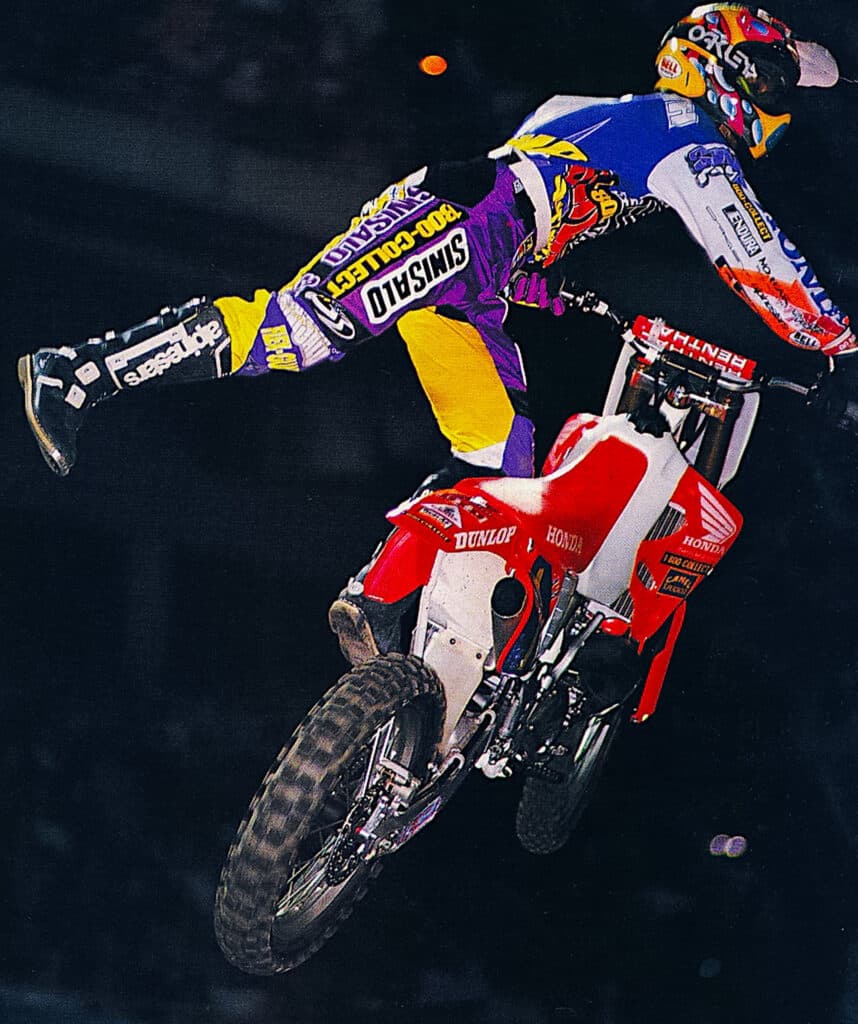
“I just let him pass me because he rides stupid, always cutting me off and stuff.” McGrath told Cycle News. “He was going fast but he’s a dick.”
With ‘Phone Home’ sewn into the back of his riding pants (marketing from the new 1-800-COLLECT sponsor), McGrath showed the Anaheim fans the nac nac, the aerial bicycle move that he worked on during the off-season.
After the race, he said something to Cycle News’ Chris Jonnum that, even today, makes him go, ‘Woah, I said that?’
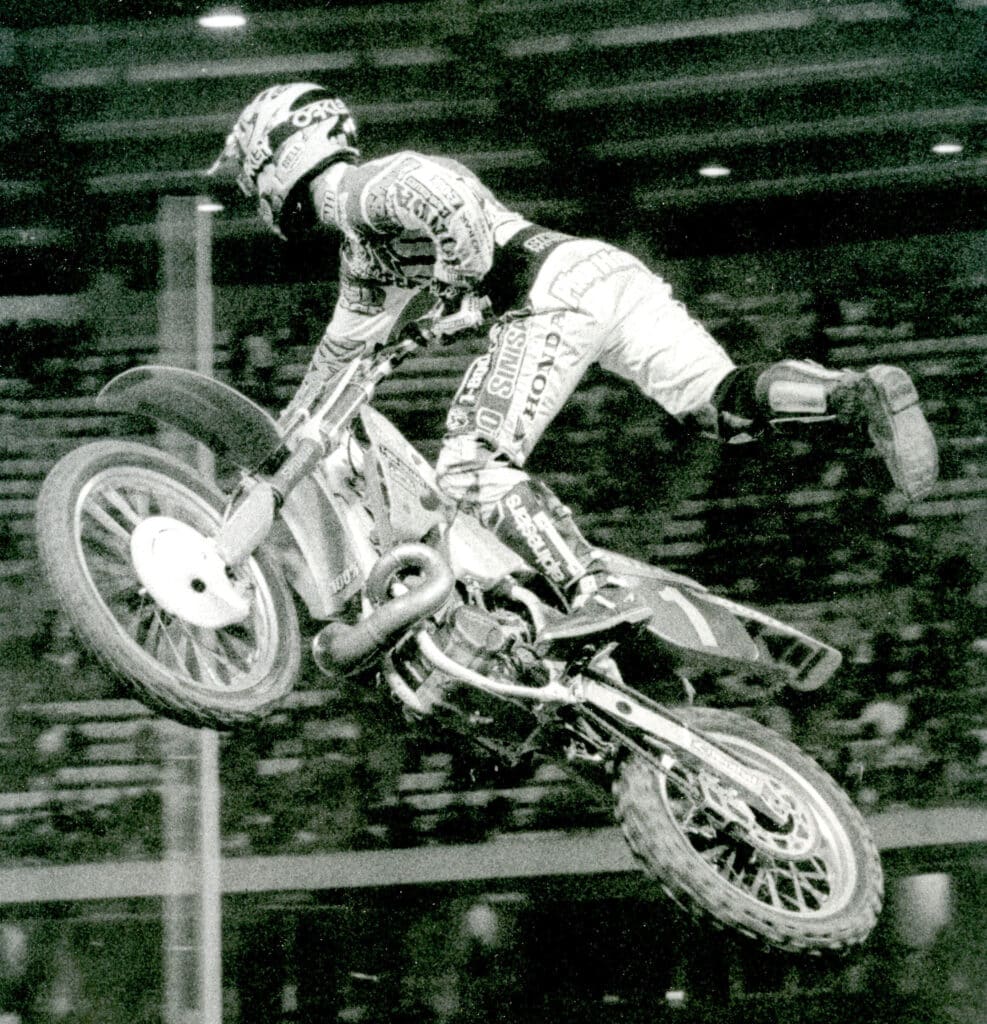
“I’m faster now than I’ve ever been. I think it would be really neat to win all 15 rounds but I doubt if that will happen. Right now, I’m just worrying about each race.”
McGrath had won three in a row and it’s reasonable to think he was pointedly asked, ‘Can you win them all?’ He won nine of the 15.
1995: Win #22
For the second year in a row, McGrath won the opening two rounds but wasn’t getting the starts he wanted and when he came out of the first corner in 11th at Anaheim, he’d had enough. He wanted a change. The Honda CR250R chassis got an update in 1995 and McGrath felt fine on it until he realized it was the reason his starts had been poor.

“It didn’t hook up well,” he says. “It was spinning a lot. It’s weird, because it was just a slight change in geometry. For whatever reason, it just wasn’t working right.”
The Anaheim round was the origin point of how McGrath ended up back on a 1993 Honda chassis through the end of his time on Red, an oft-told legend from his career.
“That chassis had the engine in the right spot. So when it took off, it really kind of just got a lot of traction.”

In Anaheim, which was soft and rutty from rain, he went into the lead on lap 12, passing Larry Ward with a point of his finger while in the air over the triples. “I must admit that I got a little nervous when I saw McGrath coming,” Ward said.
It was a big night for McGrath, who had blinking red lights on his Bell helmet. To properly celebrate with his hometown crowd, he spent $2200 buying tickets for family and friends and unexpectedly received the Mickey Thompson award of Excellence, which he still has in his office today.
Another change McGrath made in 1995 was a decision to pay closer attention to his fitness. He hired Gary Semics, a racer-turned-trainer. “I’m feeling great right now; I have the stamina and I’m feeling more like the Jeremy of 1993. Last year I kind of slacked off a little, didn’t train as much and had problems late in the races.”
Join us in The Garage

The main reason for hiring Semics was to make a serious run at winning the Pro Motocross championship. “Everyone was talking shit, ‘Oh, he’ll never be considered one of the greatest riders ever because he just can’t really ride motocross,’” McGrath says. “I’d had enough of that talk.”
McGrath finished third overall in the 1994 250/450 Pro Motocross championship, and won two motos (Kenworthy’s and Washougal), but was 159 points behind Mike LaRocco. Semics helped him get stronger and learn to deal with the suffering that comes with Pro Motocross. In the summer of 1995, he won half the motos, seven of the 12 races, and the championship.
“When you got done winning a motocross national, it was like you knew that you did something. I was winning Supercross so easy. I was like, ‘Cool. What do we do now? Let’s go do something else.’ It was just real easy.”
1996: Win #32
By now the winningest rider in sport history, McGrath arrived in Anaheim with a chrome-painted helmet. Going even further over the top, Troy Lee clear-coated $100 bills into each side of it. McGrath sprinted to another win in front of 65,264 fans, the last time a crowd that large would ever watch a Supercross in Anaheim.
It was McGrath’s 6th consecutive victory in the stadium, counting the 125SX wins from 1991-1992.
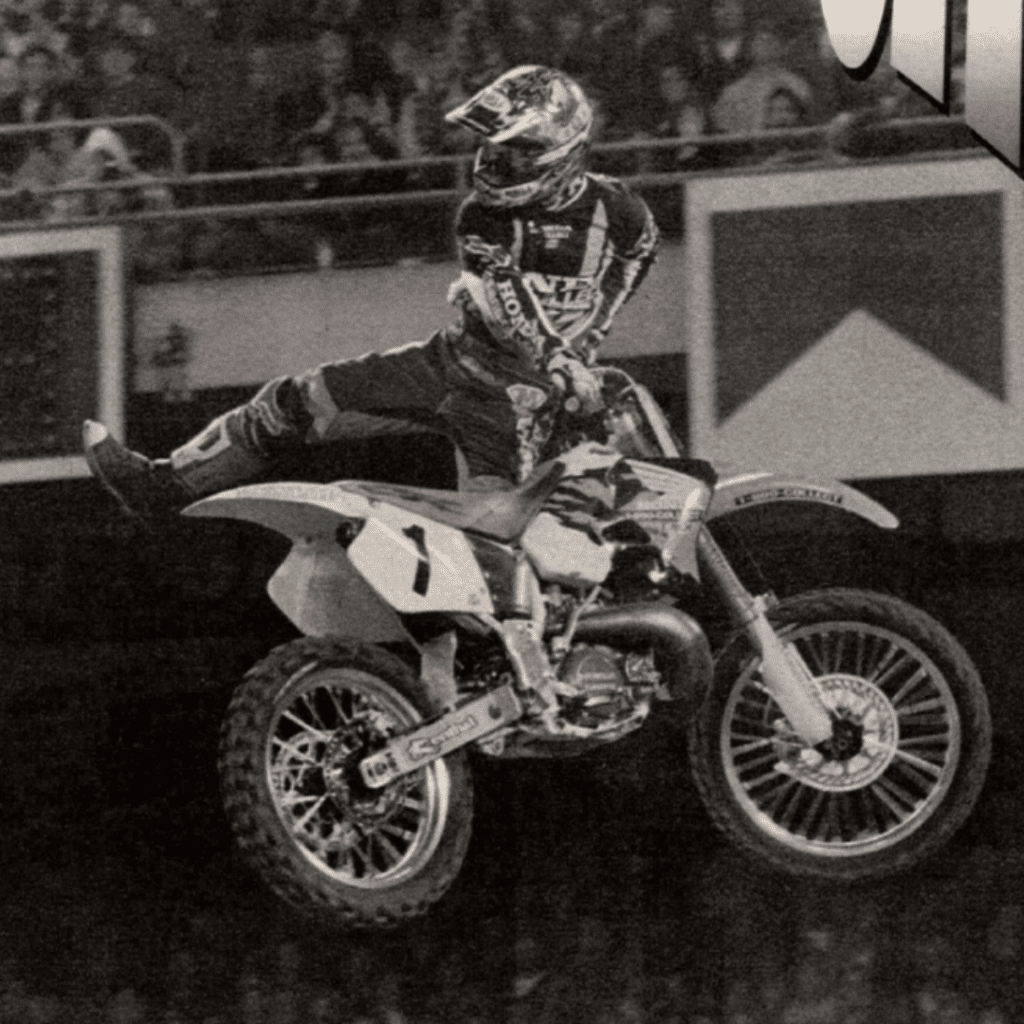
Anaheim was once again round three of the series and Cycle News again asked him if he could win them all. “No, I don’t think so,” he said. “I can sure try but I don’t think I can. I just want to be consistent and win the title. If I can win 10 again I will be stoked.”
In the end, McGrath went 14-1, losing only the St. Louis round deep in the season.
“Truthfully, I was really feeling pretty unstoppable,” McGrath says today and then re-referencing how good he felt coming out of 1995. “I really, actually, probably thought I could win them all, but I don’t think I’d ever say that in an interview.”

Construction. Then, Swing and a Miss. Twice!
Extensive renovations to return Anaheim Stadium to it original use as primarily a baseball venue (The NFL’s Los Angeles Rams spent 15 years playing in Anaheim before they moved to St. Louis) meant that the venue was off limits for the 1997 and 1998 seasons. The new facility, renamed Edison Field had a more baseball-appropriate capacity of 45,050 and east-facing views of the San Gabriel mountains.
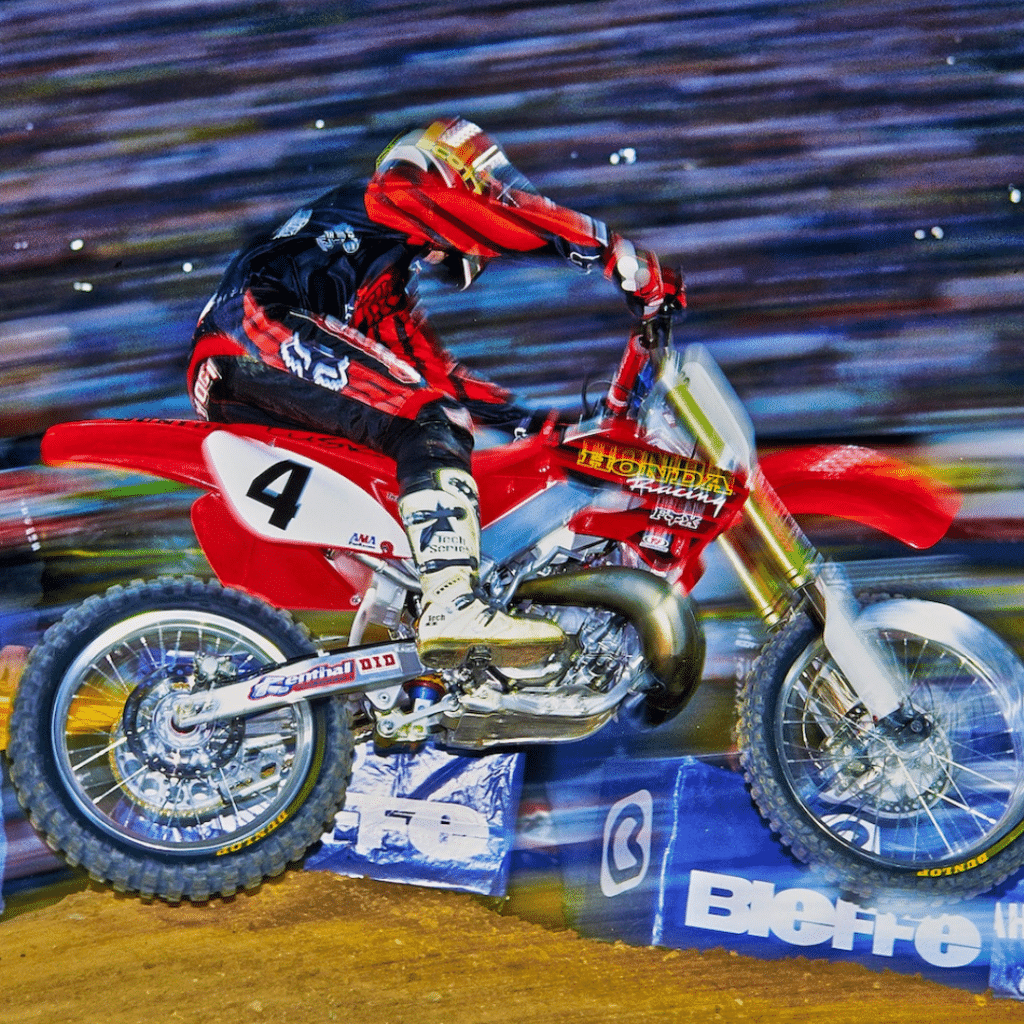
The Anaheim Supercross returned in 1999 as the season opener, the first time since 1990, and added a second stop, colloquially referred to as A2. Honda’s Ezra Lusk won both rounds, while McGrath finished 7th and 2nd. At A2, McGrath’s motor mounts came loose, which caused him to back off his pace.
2000: Wins #61 & 62
The Supercross series ran the first two rounds of the season back to back in Anaheim and McGrath won both races, the second in total domination.
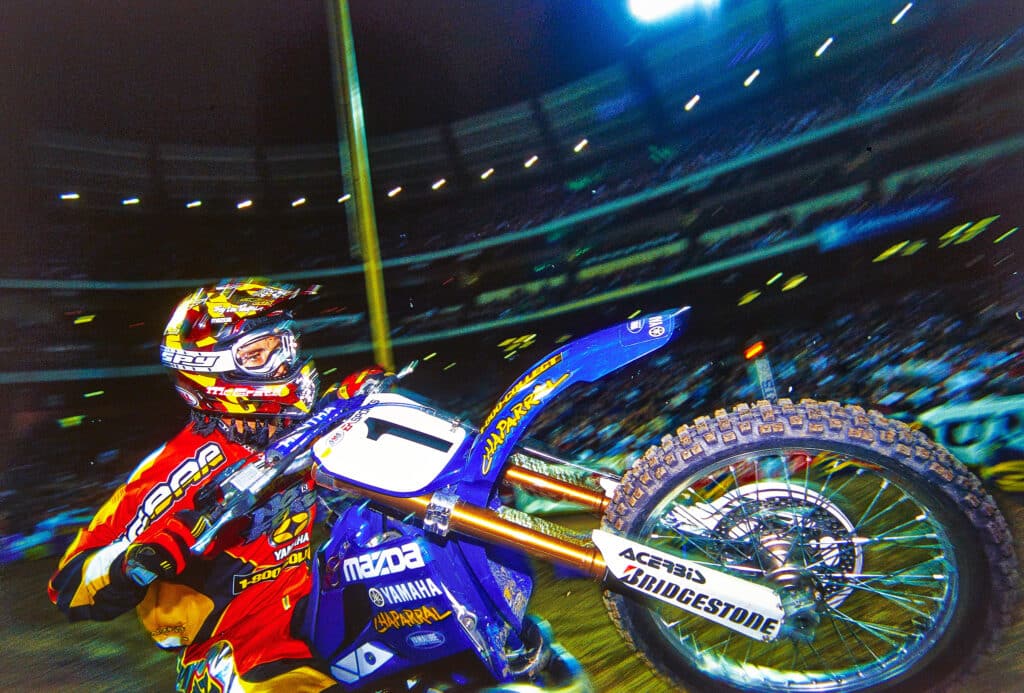
“This race is special,” he told Cycle News. “It’s my favorite race of the year.” By now, McGrath was not racing Pro Motocross at all and he mentioned how eager he was to see some gate drops. In the first round, Ricky Carmichael had a five second lead on lap seven but McGrath ran him down, engaged in a brief battle and took off.
In round two, he beat David Vuillemin by 13 seconds and Cycle News said he looked like the McGrath of 1996. He raced in another Troy Lee Designs special, the ‘dingleballs lid’, which had flanged tassels hanging from the bottom rim of the helmet. He said fun, gimmicky stuff like that, coupled with it being a local race, was almost like a superpower for him.
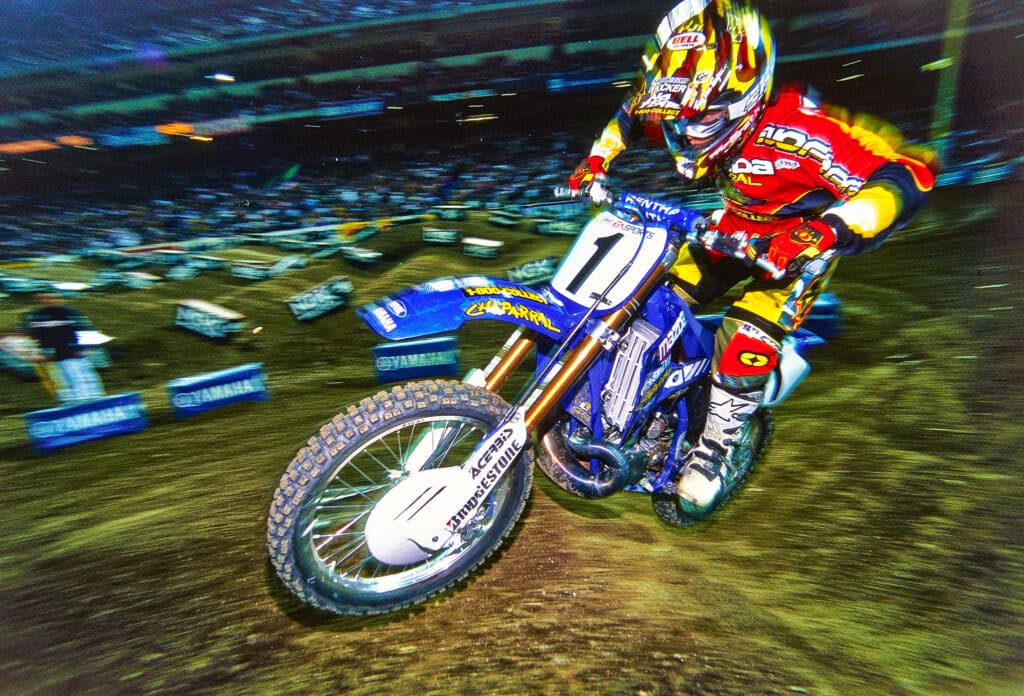
“For a lot of guys, that kind of stuff can be very stressful, but it always just gave me more energy and more stoke to just shine because I was always in something that nobody could have,” he says. “That vibe gave me a lot of energy and a lot of guys just become a house of cards in that situation.”
2001: Wins #71 & 72
What began in the shadow of the Big A, also ended there. It all circled back together for McGrath. Even mechanic, Skip Norfolk returned to work with “Showtime” for the first time since 1996. In 2001, Anaheim held three rounds of the series, specifically rounds one, three and five.
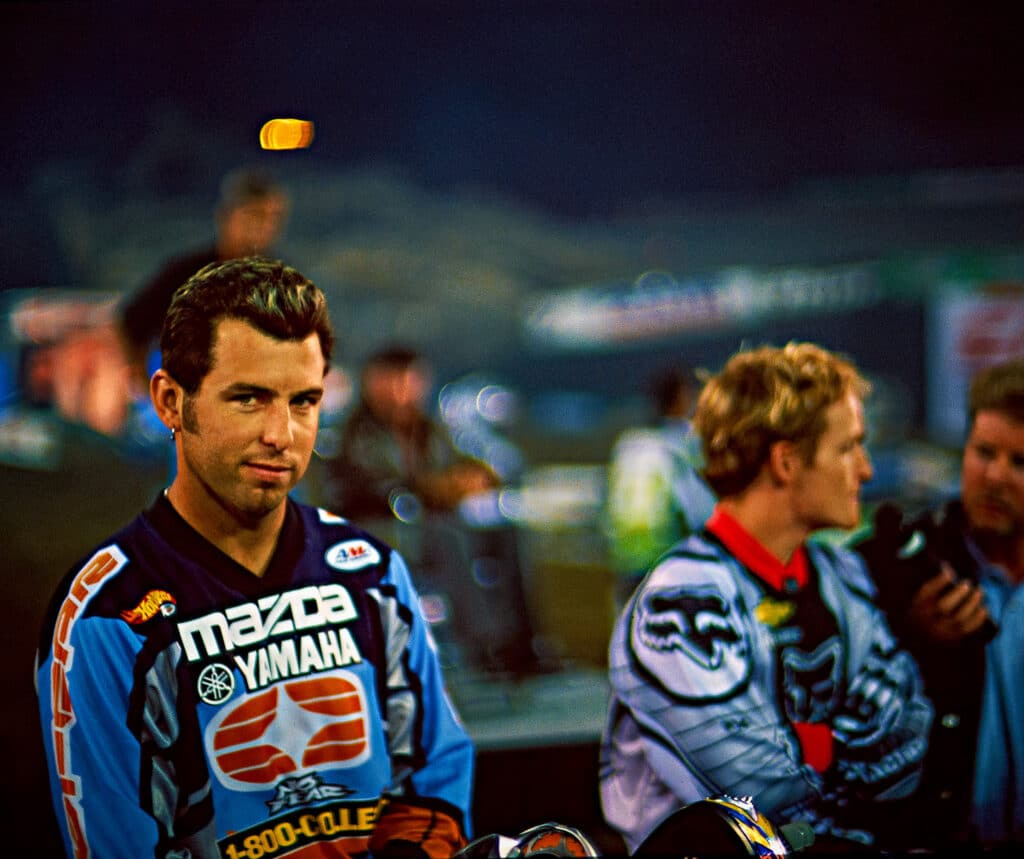
Anaheim 1 was business as usual; McGrath beat Lusk by eight seconds, prompting a reporter to ask, yet again, if another 1996-like run was about to happen. McGrath sounded almost prophetic .
“By no means,” he told Kit Palmer. “This is just the first race. “A lot is going on. This race is not really a good judge of things to come. I know it’s going to get harder than this. That win was relatively easy. A little too easy.
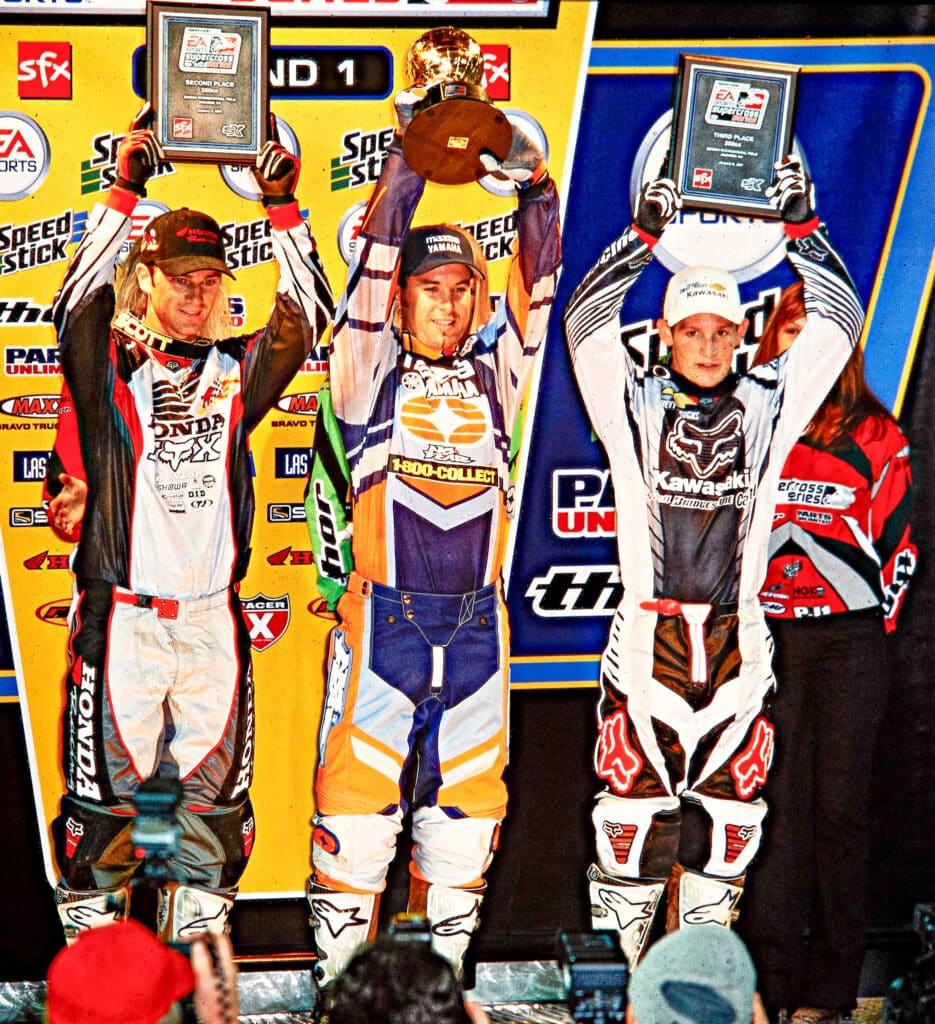
He was so correct about Round 1 not being a good judge of the season; from 2001-2023, the winner of Round 1 only won the championship five times. As far as being an easy race to win, he knew what was coming. He’d been waiting for it for years.
As Jeremy’s right hand danced through the loops of signing his own name on the final print, I opened a laptop screen and asked him to walk me through the final three laps of the main event from Round 3 of the 2001 series. Seventeen laps into the race and McGrath was forced to dig into the bottom of his well. We watch as Art Eckman bellows,
“Ricky Carmichael comes up into the rear tire of Jeremy McGrath! Three laps to go as we go into the whoops…”
“So right here,” McGrath says while continuing to watch, “I’m knowing that I’m undertrained. This is deep in the race and, basically, this is what Ricky’s advantage was. I could still ride as fast as him. I just couldn’t last as long.”
As the race unfolds in front of us, he expands on that topic, how, back in 1995 and 1996, he had the tools to handle this situation, but he simply didn’t need them at any point. By 2001, at 29 years old, he wasn’t ready to sprint on laps 18, 19 and 20.
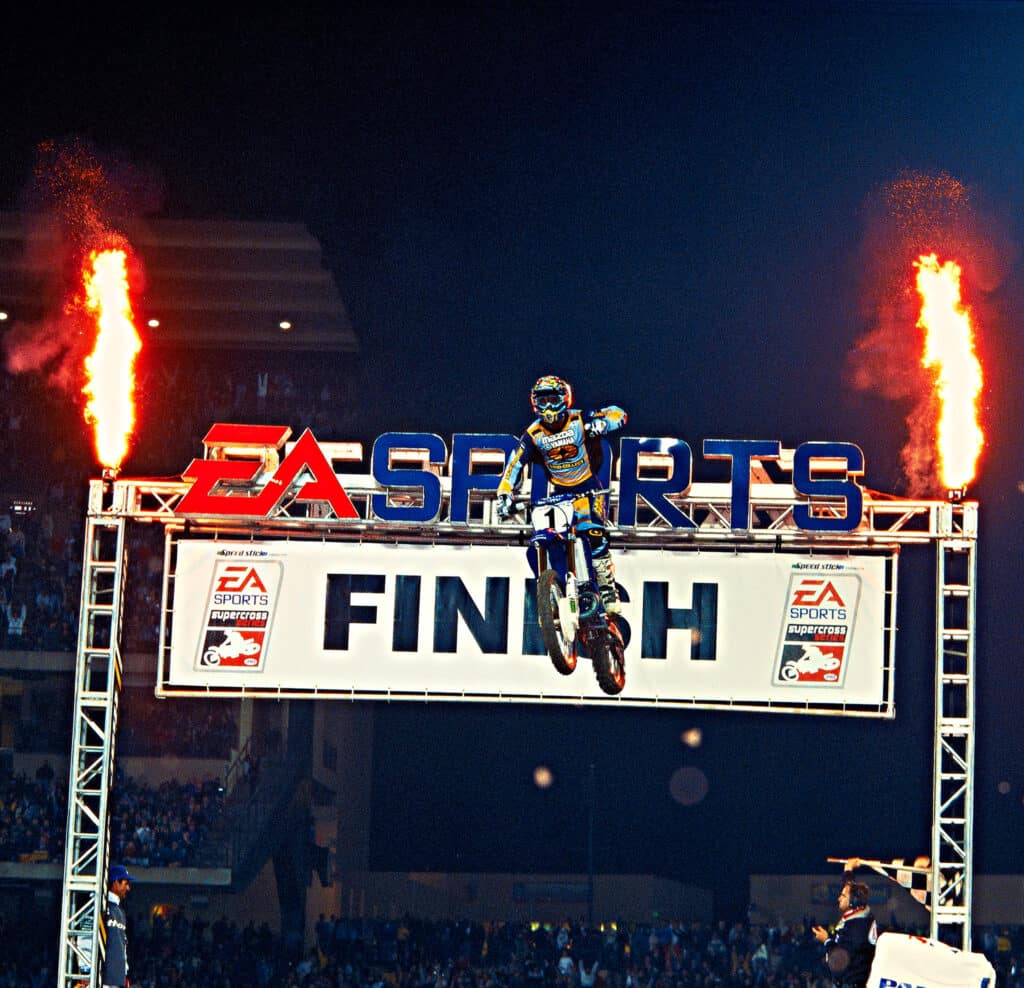
“I wish I would’ve paid more attention and been more in shape. I could have handled this. The one thing I can hang my hat on is that it took Ricky Carmichael three seasons to get me. It took me three races to get those guys [in 1993].”
After the race, he told Cycle News, “That was the best race in five years, I think. I don’t know if I’ve ever gone 20 laps like that.”
The margin of victory was reported as, and confirmed by timing and scoring, at ‘less than one thousandth of a second’, a dubious claim considering .001 is a millisecond, faster than a blinking eyelid and 33 times faster than one frame of video in a 30fps format.
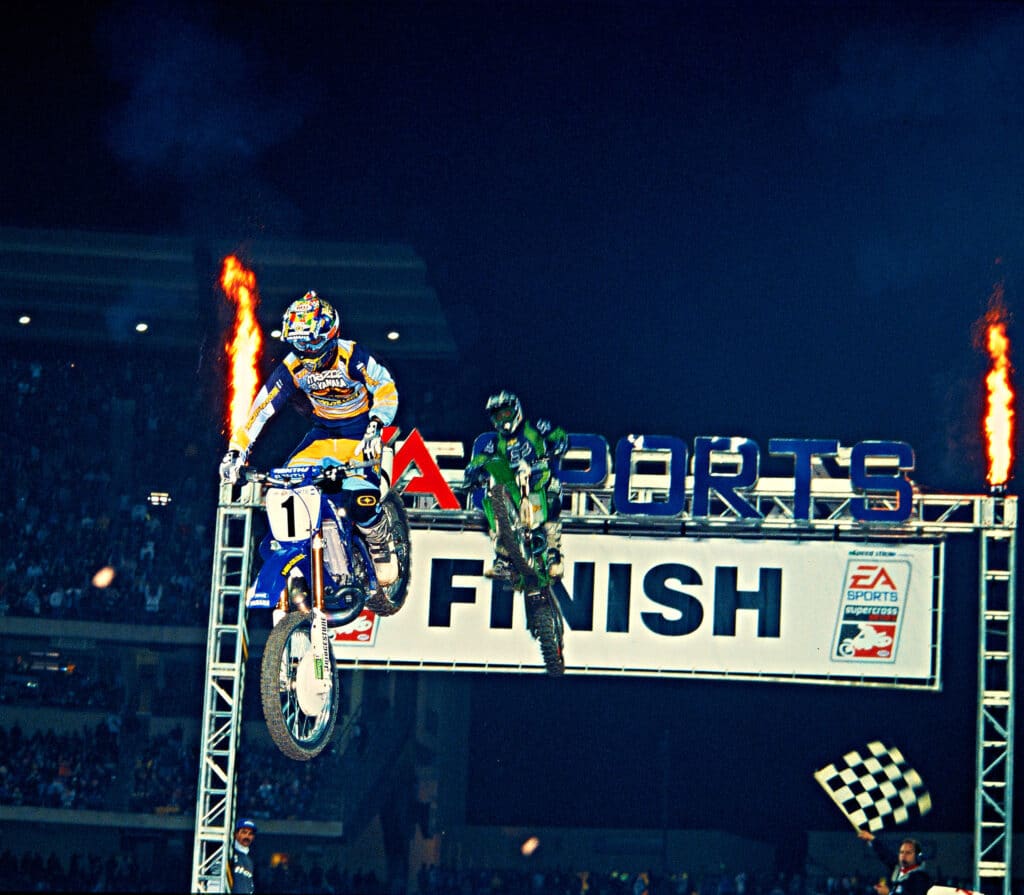
Indubitably, it was one of the closest finishes in Supercross history.
What nobody would have bet was this being McGrath’s final win ever. Two weeks later they were back in Anaheim for the third time that season and it may as well have been round one because the points were tied. Carmichael evened it up in Phoenix when he beat McGrath by almost 13 seconds.
But this was Anaheim, Jeremy’s house and he took the holeshot while Carmichael worked his way up from mid-pack. By lap 15, Carmichael was close enough to start making moves, which he did on lap 17.
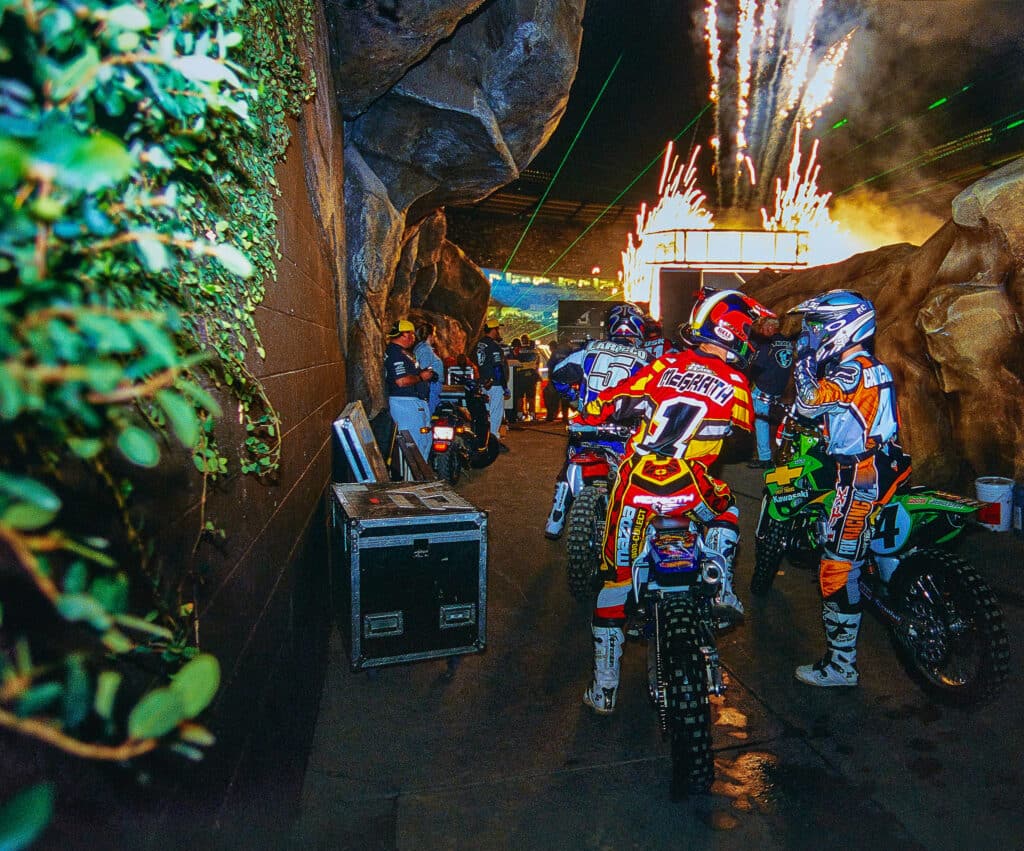
“I was riding as fast as I could,” McGrath said after the race. “I could see him coming. It was a long 20 laps.”
It was the last Anaheim podium of McGrath’s career. He earned an incredible 10 Anaheim podiums in his first 11 starts there. Eight of them were victories.
Jeremy McGrath at Anaheim Art

The End of an Era
McGrath lined up at Anaheim 9 more times, 6 of those as a part-time racer who wanted to feel the thrill again and properly say goodbye to his fans. He bagged a couple of fifths, impressive for a guy who had hung it up two and three years prior. The record of 72 wins has remained out of reach for over twenty years, despite attempts from several riders who are now along side him in the AMA Motorcycle Hall of Fame and one who will be in the future.
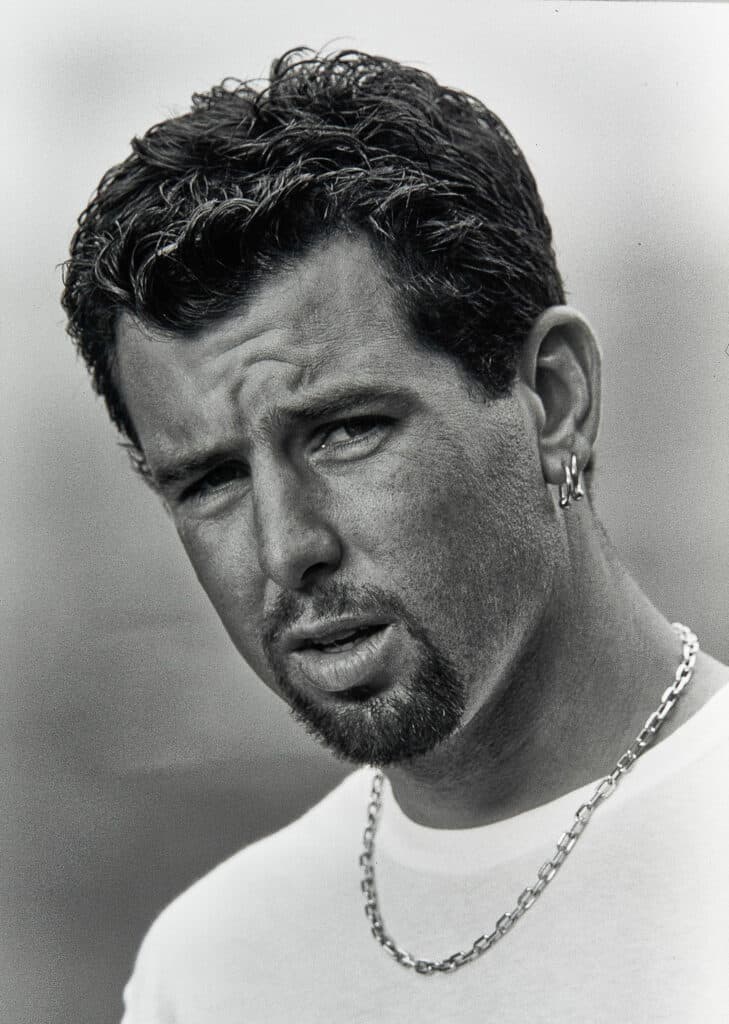
We’ve entered the era where the top upcoming top racers of the sport were not yet born when McGrath last won a Supercross race, which means that many of the fans he interacts with at the races were also not alive when he was on the gate. He’s humble enough to be unperturbed when people have no clue who he is or his relevance in the sport.
“I’m actually surprised that young kids know who I am sometimes, which means their dads are fans, right? So it is always encouraging when a little kid knows who I am because they’re like, ‘Oh, my dad was a massive fan. I’ve seen all your races.’”
And with that McGrath moves to another table in the spacious room where he chats with a young man about marketing materials for a project he’s working on.
All in the life of a king.